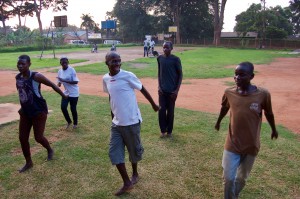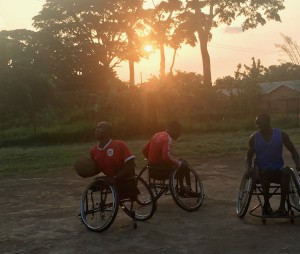The Gulu Disabled Persons Union (GDPU) sits on the outskirts of Gulu town as part of a large compound shared among six other disability organizations. The compound is made up of a basketball court and a number of small buildings clustered together that house the other organizations under GDPU’s umbrella: Gulu Women with Disabilities Union, Hope for African Disabled Persons & Orphans, Gulu Deaf Association, Gulu Blind Association, Gulu Landmine Survivors, and Gulu Wheelchair Basketball Club. All of these organizations apply for and host separate programs to support their specific beneficiaries with GDPU acting as the main contact point and organization for people with disabilities.
So what else goes on at GDPU besides building accessible toilets in local primary schools? A lot. I’m not sure that I know the full extent of it because the smaller associated organizations do not have a regular presence at their offices. In many cases, they act more as a gathering place for people with disabilities than they do as an organization with specific programmatic goals and objectives. But that is a key aspect of the purpose of GDPU: to serve as a gathering space and collective voice for people with disabilities in Gulu.
Take, for instance, the Gulu Deaf Association. They are currently conducting a sign language training as a part of their ‘official work’, however, more frequently you’ll find the deaf dance club and the deaf soccer club practicing at GDPU than you would find a sign language class. Although looking back at that, I realize that it doesn’t instill a lot of confidence in the association; however, it is what the beneficiaries need. More than anything else, the deaf dance club and deaf soccer club are a time for people who are deaf or hearing impaired to come together, laugh, and support one another. At a recent deaf dance club session I joined, I was informed that one of the members, a girl who is only 16, was pregnant. Her family and partner are not there to be a support network for her, so her friends from the Gulu Deaf Association are trying to advise her and support her. Watching the group learn new dance steps and teach one another it’s obvious that they have a lot of fun when they’re together.
The Wheelchair Basketball Club serves a similar purpose for the players. Although the club currently has no funding, it is a chance for the athletes to get together, laugh, compete, and support one another. Started in 2007 with support from Comic Relief International as well as a couple other funders, GDPU now boasts a battalion of 39 sports wheel chairs and one of the best wheel chair teams in the country. Committed and talented, the local club practices on Tuesdays and Fridays at the basketball courts on the GDPU compound. Some of the athletes are trying out for the national team, and the Gulu wheelchair basketball team has won national competitions as well.
The camaraderie and support of these groups should not be under sold. Even if they operate with no funding or specific goals, they’re vital for the people taking part. As I’ll talk about in another blog, the stigma and misconceptions that PWDs face in Uganda leave many without support or social networks. This is the most important thing that GDPU does, they provide a social network when the family or institutional networks have failed.
Click here for more pictures from GDPU and the continued construction at Ogul Primary School.
Posted By Lauren Halloran (Uganda)
Posted Aug 2nd, 2017




304 Comments
Judy
August 3, 2017
I love reading your posts about Gulu and the GDPU. The inclusion aspect of all students is so important but also providing a social network for disabled people is equally important. Nice reporting Lauren. Good for you that you are not just there to build new toilets but also to get involved in the community. Hope you learned some new dance moves. Can’t wait for your next post.
SweaterVest
August 4, 2017
I had sister Mildred in wheelchair for my childhood. Very difficult to help her! She always trying play basketball but I told her too dangerous – Even for me! (not in wheelchair). Now we sit together in silence around radio – so happy and safe! Thank you Laurenhalloran again for raising awareness for these dangerous games and thoughts